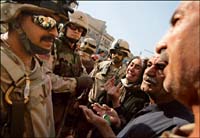Iraqi security forces announce capture of senior insurgent
Iraqi security forces announced the capture of a senior al-Qaida in Iraq figure as they sought to deflect criticism of their handling of a surge of sectarian violence. The U.S. ambassador said the risk of civil war from last week's crisis was over.

Violence throughout Iraq killed 36 people Monday, as fierce fighting broke out between Iraqi commandos and insurgents southeast of the capital. But sectarian clashes have declined sharply since the bloodletting that followed the destruction of a revered Shiite shrine in Samarra, and Baghdad residents returned to their jobs after three days of a government-imposed curfew.
"That crisis is over," U.S. Ambassador Zalmay Khalilzad declared.
"I think the country came to the brink of a civil war, but the Iraqis decided that they didn't want to go down that path, and came together," the ambassador told CNN. "Clearly the terrorists who plotted that attack wanted to provoke a civil war. It looked quite dangerous in the initial 48 hours, but I believe that the Iraqis decided to come together."
Sunni Arab leaders said they were prepared to end their boycott of the talks on a new government if Shiites return mosques seized in reprisal attacks against Sunnis and meet other unspecified demands.
Also Monday, Iraqi Interior Ministry officials said they believe American journalist Jill Carroll remains alive the day after a deadline set by her captors passed with no word of her fate. A senior ministry official refused to say why they don't believe Carroll's captors carried out their threat to kill the 28-year-old freelancer for the Christian Science Monitor.
The captured al-Qaida figure was identified as Abou al-Farouq, a Syrian who financed and coordinated groups working for Iraq's most wanted terrorist, Abu Musab al-Zarqawi, in the insurgent stronghold of Ramadi, according to an Interior Ministry officer who spoke on condition of anonymity because he was not authorized to address the media, reports the AP.
Subscribe to Pravda.Ru Telegram channel, Facebook, RSS!





